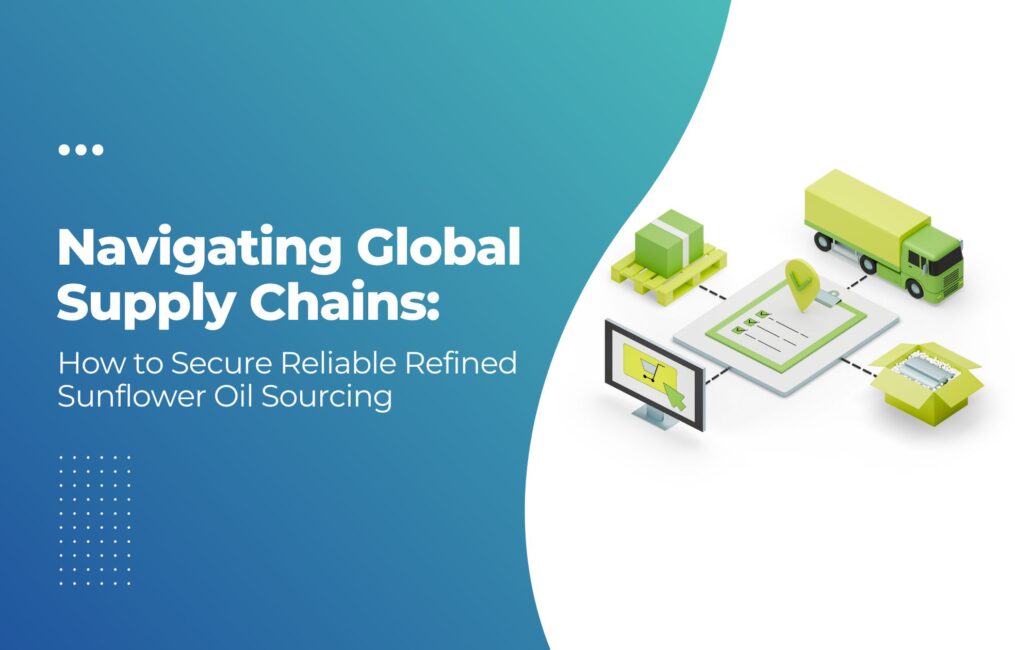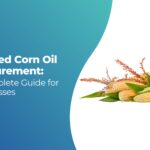Navigating Global Supply Chains: How to Secure Reliable Refined Sunflower Oil Sourcing

Most of the global food brands today have one ingredient quietly anchoring its success—sunflower oil. From snack manufacturers scaling production lines to household kitchens demanding healthier choices, refined sunflower oil has become a staple across industries. But as demand surges, so does the complexity of sourcing it.
What once seemed like a straightforward transaction—finding bulk refined sunflower oil at the right price—is now layered with global trade disruptions, fluctuating yields, and quality inconsistencies. The real challenge is no longer just about buying; it’s about building a refined sunflower oil sourcing strategy that can withstand supply chain shocks while ensuring consistency and trust.
This is where the conversation shifts from procurement to foresight. Businesses are beginning to realize that securing reliable sourcing isn’t only about availability—it’s about anticipating risks, diversifying partners, and ensuring sustainability in every liter delivered. And in this narrative, reliability becomes more than a metric; it becomes the difference between scaling with confidence and stalling under pressure.
Understanding the Global Supply Chain for Refined Sunflower Oil
Picture the sunflower oil supply chain as a living network stretching across continents—fields in Ukraine and Russia feeding Europe, vast farms in Argentina supplying Latin America, and India emerging as both a consumer giant and a refining hub. Each region plays a critical role, and together they power the world’s kitchens, bakeries, and packaged food industries.
As per the sources Fortune Business Insights, the global sunflower oil market size is anticipated to reach $37.74billion by 2032. With a projected CAGR of 6.23% over the forecast period (2025-2032), the sunflower oil market is being driven by growing utilization of the product in various culinary preparations, animal feed, and others.
But this network doesn’t operate in isolation. It’s constantly tested by shifting geopolitics, trade agreements, and shipping routes. A conflict in Eastern Europe can instantly ripple into price volatility across Asia. A port bottleneck in the Black Sea can delay entire shipments, forcing buyers to scramble for alternatives. Even small regulatory shifts—an import duty here, a sustainability mandate there—can redefine sourcing patterns overnight.
This is the new reality of global edible oil sourcing. Supply is no longer just about where the oil is produced; it’s about how resilient the pathways are from farm to factory. And for businesses relying on refined sunflower oil, understanding these interdependencies isn’t optional—it’s the first step in securing reliability at scale.
Challenges in Refined Sunflower Oil Sourcing
Behind every container of refined sunflower oil that makes its way to a factory floor lies a web of uncertainties. For buyers, the most pressing one is price volatility. A sudden drought in a producing country or geopolitical turbulence in Eastern Europe can send prices spiraling overnight. What was a predictable cost line item yesterday becomes a strategic risk today.
When it comes to refined sunflower oil sourcing, buyers face a few recurring hurdles:
- Price Volatility: Global weather shifts, trade tensions, and conflicts can spike costs overnight, making budgeting unpredictable.
- Quality Variations: Not all shipments meet strict sunflower oil quality standards. Even small inconsistencies can disrupt large-scale food production.
- Regulatory Barriers: Every region has its own compliance rules. Add in sunflower oil import and export restrictions, tariffs, and labeling laws, and the sourcing map becomes complex.
- Logistics Pressures: Rising freight costs, shipping delays, and port bottlenecks often stretch delivery timelines, testing reliability.
Read our blog to know how to build a future-proof edible oil sourcing strategy and overcome all the challenges.
Strategies to Secure Reliable Refined Sunflower Oil Sourcing
Think of your sourcing engine as a control tower: streams of data in, decisions out—fast, traceable, defensible. Here’s how to build it for bulk refined sunflower oil with depth (not fluff).
Engineer Resilience with Supplier Diversification
- Dual–multi sourcing by geo + process: Keep at least 2–3 origin paths (e.g., Black Sea, South America, India) and 2 refining routes (winterized vs. non-winterized where relevant) to hedge climate, conflict, and port risks.
- Kraljic + risk scoring: Classify sunflower oil as strategic; score suppliers on OTIF, lead time variance, COA pass rate, FX exposure, port dependency. Rebalance quarterly.
- Barbell routing: Anchor capacity with incumbents; keep 15–25% flexible with challengers for agility.
- Spec harmonization: Standardize specs so multiple reliable sunflower oil suppliers can fulfill the same PO without re-qualification.
Lock Predictability with Long-Term Supplier Contracts
- Volume bands + indexation: Use quarterly volume bands with price formulas tied to recognized veg-oil indices + freight adjustors (+ FX). Add caps/floors to smooth spikes.
- Performance SLAs: Embed OTIF ≥ 95%, COA pass ≥ 99%, lead time ≤ X days, corrective action ≤ 5 business days. Incentivize with bonus–malus.
- Allocation priority clauses: In disruption events, priority supply for contracted buyers against a minimum guaranteed allocation.
- Quality & substitution rules: Permit pre-approved equivalent refiner substitutions if specs match and COA is provided pre-loading.
- Audit rights: Annual GMP/HACCP audit + surprise document checks (traceability, pest control, allergen controls).
Make Quality Measurable: Certifications, Testing, Compliance
- Cert stack to require:
- Food safety: FSSC 22000 / ISO 22000, HACCP, GMP
- Traceability/Sustainability (where applicable): ISCC PLUS
- Market-specific: FSSAI (India), EU food regs (for importers), Non-GMO declarations, Halal/Kosher if needed
- COA + retain samples: Mandatory batch COA before vessel cut-off; retain sealed retains (6–12 months) for dispute resolution.
- Packaging & handling for bulk refined sunflower oil:
- Flexitanks / IBCs / drums with nitrogen blanketing, UV-protected; 20–25°C storage, avoid light/oxygen to slow oxidation.
- Define shelf life and first-expire, first-out (FEFO) rules in WMS.
Build for Tomorrow: Sustainability That Survives Audits
- Policy to practice: Publish sourcing policy; require supplier Code of Conduct, ISCC PLUS (or equivalent) where applicable, non-deforestation assurances (sunflower is low-risk, still state it), non-GMO declarations if market needs.
- Scope 3 tracking: Collect farm→refinery emissions data, energy mix, water use; request mass-balance documentation.
- Regenerative signals: Encourage crop rotation, soil health metrics; pilot premiums for compliant farms.
- Waste & circularity: Oil loss KPIs, soapstock handling, and used cooking oil recovery partnerships for biodiesel streams.
- Auditable claims: No “green” copy without evidence packs (cert IDs, date ranges, volumes covered). That’s sustainable sunflower oil sourcing you can defend.
Financial Risk Guardrails (Don’t Skip)
- Hedge the trio: Index exposure, freight (BAF/FAF), FX. Use collars or layered buys; avoid single-date cliffs.
- Safety stock math: For A-class SKUs, target cycle service level ≥ 95%; compute safety stock from σ(lead time demand); review monthly.
- Incoterms & lane design: Balance CIF for simplicity vs. FOB for control; maintain at least one alternate port + carrier per lane.
Governance & Cadence
- Monthly S&OP lite: Demand, cover position, risk log, supplier scorecards, claim summaries.
- Quarterly re-qualification: Mini-audits, price formula tune-ups, capacity checks before peak seasons.
- Crisis drills: Simulate a 20% shortfall; test your reallocation + communication tree.
How Neshiel Agrochem Ensures Reliable Refined Sunflower Oil Sourcing
In a world where edible oil supply chains bend under the weight of disruption, reliability becomes a differentiator. Neshiel Agrochem is a reliable refined sunflower oil sourcing company that focuses on building trust with every shipment.
- Quality Without Compromise
Every lot of Neshiel Agrochem refined sunflower oil undergoes rigorous testing — from free fatty acid levels to peroxide values — ensuring buyers receive oil that consistently meets international food-grade standards. Our process doesn’t just pass audits; it anticipates them. - Scale That Matches Ambition
Whether it’s a mid-sized food manufacturer or a multinational, our infrastructure is built to deliver bulk refined sunflower oil at volumes that align with fluctuating demand. Flexitanks, drums, or IBCs — logistics are tailored to buyer needs without compromising freshness or stability. - A Trusted Network That Delivers
We don’t just procure; we partner. Our network of reliable sunflower oil suppliers spans producing geographies and refining hubs, giving us the agility to reroute supply lines when markets shift. That means fewer disruptions, faster turnarounds, and consistency that buyers can bank on. - Transparency That Builds Trust
Every delivery is backed with full traceability—COAs, certifications, and documented chain of custody. For buyers, that translates into confidence not just in the oil they receive, but in the partner they source it from.
For Neshiel Agrochem, reliability isn’t measured in containers shipped, but in the confidence we give businesses to scale without fear of supply interruptions. That’s the foundation we’ve built — and the reason why leading brands place their trust in us.
Contact us to make your first bulk order with us.
FAQs on Refined Sunflower Oil Sourcing
Q1. Why is refined sunflower oil sourcing considered complex?
Refined sunflower oil sourcing is shaped by geopolitics, logistics, and quality assurance challenges. Global edible oil markets are highly volatile, and factors like port restrictions, trade tariffs, and fluctuating crop yields can impact stability. Businesses working with reliable sunflower oil suppliers and leveraging tech-driven procurement strategies gain resilience against these risks.
Q2. What makes Neshiel Agrochem refined sunflower oil a trusted choice?
Neshiel Agrochem refined sunflower oil stands out because of its strong supplier ecosystem, rigorous quality standards, and scalable bulk supply capability. The company integrates testing, certification, and compliance checkpoints across the supply chain—ensuring consistency for both domestic and global buyers.
Q3. How can businesses ensure sustainable sunflower oil sourcing?
To achieve sustainable sunflower oil sourcing, companies must go beyond cost-driven procurement. This involves:
- Partnering with growers that follow regenerative agriculture practices.
- Verifying suppliers with certifications (ISO, HACCP, sustainability seals).
- Using blockchain and AI to trace origin-to-shelf transparency.
Sustainability is not just ethical—it builds long-term supply stability.
Q4. What factors should be checked before bulk refined sunflower oil procurement?
When sourcing bulk refined sunflower oil, companies should evaluate:
- Supplier reliability and delivery track record.
- Compliance with sunflower oil quality standards.
- Storage, packaging, and transport systems that preserve oil integrity.
- Pricing flexibility with long-term contracts to hedge volatility.
This ensures both cost efficiency and consistent quality.
Q5. How do sunflower oil import and export regulations affect supply?
Global sunflower oil import and export is shaped by trade duties, geopolitical alliances, and shipping lane disruptions. For example, sanctions or quota limits from producing nations like Ukraine or Russia can instantly tighten supply. Companies that diversify sourcing across multiple geographies build better protection against these shocks.


